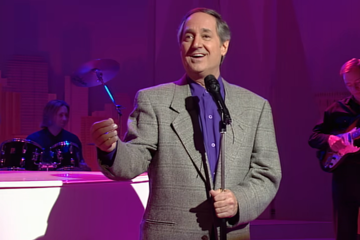The Federal Government has ruled out a proposed text-and-data-mining exception in the Copyright Act following backlash from artists and music industry groups.
Australia’s Attorney General, Michelle Rowland, is expected to confirm the decision today, The Guardian reports, effectively shutting down the controversial proposal presented by the Productivity Commission and supported by tech companies.
This morning, Rowland commented, “Australian creatives are not only world-class, but they are also the lifeblood of Australian culture, and we must ensure the right legal protections are in place.”
The Productivity Commission’s interim report, Harnessing Data and the Digital Economy, published in August, became controversial within the arts sector after suggesting that Australia grant an exemption to Australia’s copyright laws that would allow technology companies free access to Australian art to train AI models.
In the report, the Productivity Commission presented the Government with recommendations that are focused on four potential policy reform areas.
Don't miss a beat with our FREE daily newsletter
Those reform areas included exploring the productivity potential of artificial intelligence (AI), establishing new pathways to expand data access, supporting safe data access and use via outcomes-based privacy regulation, and enhancing reporting efficiency, transparency, and accuracy through digital financial reporting.
Also within the report was the idea of creating a new “fair deal” exception in the Copyright Act for AI-generated text and data mining, which the Australian Recording Industry Association (ARIA) and Phonographic Performance Company of Australia (PPCA) previously said was “ill-considered and contrary to Australia’s best interests.”
Annabelle Herd, CEO of ARIA and PPCA, welcomed the Albanese Government’s decision.
“This decision reinforces Australia’s commitment to its artists and creative industries, ensuring that consent, control, and compensation remain at the heart of copyright in the age of artificial intelligence,” Herd said.
“It recognises the inherent value of Australian creativity and culture, including First Nations Culture. It recognises that copyright and IP laws are the foundation of the creative economy, the digital economy, and the technology industry.”
Adding that the federal government “made the right call” in rejecting the proposed text and data mining exception, Herd thanked Rowland for “standing firmly to uphold copyright law, but also for making the commonsense decision: to back the rights of artists, authors, creators, and rights-holders over a small group of large, powerful tech companies.”
Herd noted that members of the Copyright and AI Reference Group will travel to Canberra to “make the case” for protecting Australia’s cultural sovereignty. They’ll be backed by artists and industry leaders as they discuss the future of copyright and technology.
Herd continued, “Make no mistake: it is not for tech giants to determine how creators’ IP is utilised, even in negotiation. There are no grounds for new loopholes or amendments that diminish a creator’s right to transparency and permission over how their work is used. Protecting that agency is how we build a creative economy that continues to grow, inspire and compete globally.
“The current copyright licensing structures are proven and reliable, but also flexible, fast and supportive of creativity and innovation. IP laws are what tech companies rely on to protect and monetise their products, and they drive innovation. The growing number of music licensing deals with ethical AI companies make that irrefutable.
“We should not be considering new models or creating loopholes; we should be upholding the laws that already sustain thousands of jobs and exports.”
Dean Ormston, Chief Executive of APRA AMCOS, added: “This is a significant moment for Australian creators and our cultural sovereignty. The Australian Government has recognised that Australia’s world-leading licensing framework is the pathway to ethical AI development, not a barrier to innovation.
“For far too long, the tech sector has made the false claim that Australia's copyright framework is preventing AI development in Australia. This lobbying narrative has been thoroughly debunked.
“If copyright was truly the barrier the tech lobby claims, the multi-billion-dollar investments in Australia from companies including Amazon and OpenAI wouldn’t be happening.
“From Washington, Brussels, and London, to Beijing, Tokyo, New Delhi, and Canberra – tech platforms are shopping for jurisdictions that will water down copyright legislation so that they can find ways to avoid paying creators while profiting from their cultural IP.”
Adding that the industry is “ready to work constructively” to develop practical licensing solutions, Ormston said it’s time for technology companies to “stop delaying and start licensing discussions” on creative materials for AI platforms.
“Australia is demonstrating global leadership by maintaining strong copyright protections to encourage practical licensing pathways for AI,” Ormston continued. “This will ensure the cultural and creative sector shares in the success of AI and is not left out of the economic return.
“Other nations are watching closely as we chart a course that respects both innovation and creator rights.”
APRA AMCOS’ recent AI and Music report found that 82% of music creators in Australia expressed concerns that AI is preventing them from making a living.
Ormston concluded, “Australia has a $975 million music export economy and an $8.78 billion music industry. The Government’s decision protects these jobs and our cultural sovereignty while ensuring AI development proceeds through fair licensing arrangements.
“The question now is whether tech companies will engage in good faith or continue with the delaying tactics of thoroughly discredited arguments.”
As AMPAL notes, AI moves fast—but copyright stands firm.
“This is a big win for songwriters and composers, and the publishers who champion them,” said Damian Rinaldi, CEO of AMPAL. “By rejecting a TDM exception, the Government has made it clear that permission and compensation still matter in the age of AI.
“AMPAL has always believed that licensing, not exceptions, is the right path forward, so we applaud the Albanese Government’s decision to uphold copyright law and stand with Australia’s creative community.”
AMPAL Chair Clive Hodson added, “The Federal Government’s rejection of a TDM exception finally gives much-needed certainty to Australia’s music publishers, for whom the risk of creative theft was acutely felt. Creators and their partners can now move forward with confidence and continue to excel on the global stage.”
















